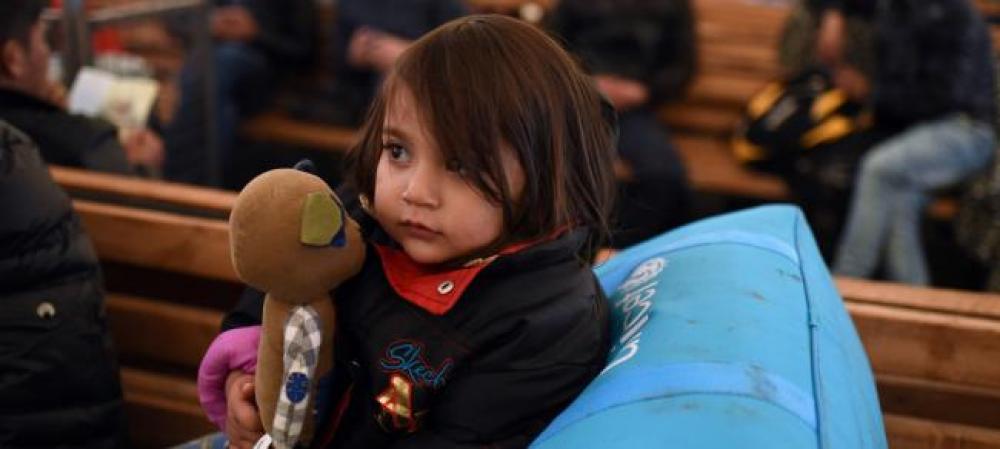Just Earth News | @justearthnews | 30 Jun 2018, 06:15 am Print

New York: UN humanitarian agencies on Friday broadly welcomed a freshly-inked deal on migration by European Union leaders which calls for more Member States to take responsibility within their borders for those in need of protection, amid a hardening stance by some since 2015.
In a joint statement, the UN Migration Agency (IOM) and the UN Refugee Agency (UNCHR) said that while the finer detail of the accord needs to be examined, they “stand ready to support a common approach”.
Echoing those sentiments, UN Children’s Fund (UNICEF) cautioned that more details were needed regarding the detention of minors and the processing of asylum claims for youngsters.
Speaking in Geneva, UNHCR spokesperson Charlie Yaxley noted that the development comes at a time when more than 1,000 people have died trying to cross the Mediterranean Sea to Europe for the fifth year in a row.
He noted the “disproportionate responsibility” that has been placed on “a small handful of States” by the long-running migration crisis – which peaked in 2015 - leading to search-and-rescue boats being denied the chance to disembark hundreds of individuals picked up at sea.
What was needed, the UNHCR spokesperson added, was “a unified approach that moves away from some of the more recent actions where we have seen States unilaterally seeking to harden or strengthen borders or restrict access to the asylum space”.
A crucial part of the EU deal reportedly involves the creation of additional “regional disembarkation points” and “disembarkation centres” for new arrivals.
“We are not talking about external processing centres,” Doyle added, noting a “specific agreement to share the responsibility and have it not just in the so-called frontline states: Spain, Italy, Cyprus, Greece, et cetera.” IOM’s spokesperson Leonard Doyle said that “the majority” of these “should be in Europe”, although these could be “potentially elsewhere”, the agency said in a statement.
Currently, Libya is a major transit point for migrants and refugees heading to Europe, but the UN has repeatedly warned about rights violations linked to detention centres there – including slavery - and by human traffickers.
Responding to a question about Libya’s role in the EU deal, the IOM spokesperson said that any centres operating outside the EU would be subject to “rigorous international standards and monitoring”, adding that it was “quite a high bar”.
UNHCR’s Charlie Yaxley also noted said that the agency “wouldn’t want to see an increase in the number of people being taken to Libya” amid a “general climate of lawlessness and insecurity” that still prevails there.
Asked about how youngsters would be treated under the terms of the deal, Sarah Crowe from the UN Children’s Fund (UNICEF) said that the “detention issue” needed clarifying.
“Children should not be detained based on their migration status, that is never in their best interest and deeply harmful", she said.
Ahead of the EU agreement, the UN agency maintained that a “well-managed and predictable European disembarkation mechanism could save children’s lives”, in addition to speeding up asylum procedures and improving access to legal aid.
Crowe welcomed the potential for quicker asylum processing for children as a “good step”. “Children really need to have a timely action, so that their claims and their future are swiftly decided,” she added.
Approximately 40,000 refugees and migrants have arrived in Europe via maritime routes so far this year, according to IOM.
This is almost six times less than in 2016 over the same period, following a peak in arrivals in 2015, and approximately 30 per cent of those arriving on European shores needed international protection.
UNICEF/Tomislav Georgiev
- Viral Irish food bank photo sparks shocking racist attacks on Indians
- Caught on camera: Two foreigners assaulted in Israel in an alleged racial attack
- Pakistan: Parents heartbroken after court sides with man accused of kidnapping minor Christian girl
- Pakistan: Trafficked 35 years ago, Bangladesh-born woman approaches court against FIA for offloading her from flight!
- Hindu tea worker found bound and bloodied in Bangladesh garden during general elections; investigation underway





-1763561110.jpg)
